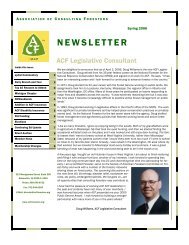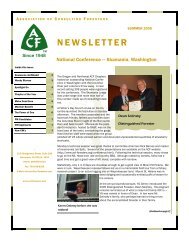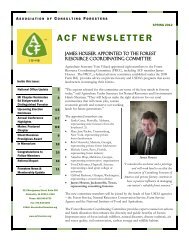Summer 2007 ACF Newsletter - Association of Consulting Foresters ...
Summer 2007 ACF Newsletter - Association of Consulting Foresters ...
Summer 2007 ACF Newsletter - Association of Consulting Foresters ...
You also want an ePaper? Increase the reach of your titles
YUMPU automatically turns print PDFs into web optimized ePapers that Google loves.
Page 4<br />
<strong>ACF</strong> NEWSLETTER<br />
Focus is on Renewable Energy and Carbon Protocols<br />
Doug Williams, <strong>ACF</strong> Legislative Consultant<br />
Forest industry stakeholders, including <strong>ACF</strong>, have joined together in a new coalition to promote energy production<br />
from woody biomass. The coalition was successful in broadening the definitions <strong>of</strong> renewable energy to include<br />
woody biomass and cellulosic ethanol in the CLEAN Energy Act <strong>of</strong> <strong>2007</strong>.<br />
The U.S. House <strong>of</strong> Representatives passed their proposed <strong>2007</strong> Farm Bill on July 27. <strong>ACF</strong> worked with a broad<br />
coalition <strong>of</strong> partners on three titles within the bill – Conservation, Forestry, and Energy. Provisions <strong>of</strong> interest include:<br />
expanding the Secretary <strong>of</strong> Agriculture’s advisory Forest Resources Coordinating Committee to include a<br />
seat for a private forestry consultant; establishing national priorities for the Forest Service State and Private Forestry<br />
program to conserve and manage working forest landscapes; providing 5% <strong>of</strong> cooperative forestry assistance<br />
directly to providers and not through State <strong>Foresters</strong>; broadening agricultural energy initiatives to include<br />
woody biomass from all sources and placing cellulosic ethanol on equal footing with other forms <strong>of</strong> renewable energy;<br />
and creating new markets through establishment <strong>of</strong> an Environmental Services Standards Board and other<br />
measures to facilitate emerging markets such as carbon sequestration.<br />
In discussions with the Chairmen <strong>of</strong> both the House and Senate Agricultural Committees last week, they advised<br />
constituents not to be too concerned if the Farm Bill is not completed by September 30 when some programs are<br />
due to expire. Senator Harkin and Congressman Peterson said temporary measures can be provided where<br />
needed, but what is more important is for proper policy to be developed. Indications are that a completed farm bill<br />
may still be six months away. <strong>ACF</strong> is reviewing early draft language for the Senate’s Farm Bill.<br />
<strong>ACF</strong> is part <strong>of</strong> a small group <strong>of</strong> forestry advocates meeting to discuss carbon protocols being developed that will<br />
dictate the rules for participation. California and Georgia are developing protocols that represent two completely<br />
different approaches – California with over 350 pages <strong>of</strong> overly-complex and cost-prohibitive requirements, and<br />
Georgia with only 19-pages <strong>of</strong> ‘understandable and practical’ guidelines. With the potential release <strong>of</strong> draft protocols<br />
in August for a 34 multi-state registry, the group is working together to explore how we might collectively engage<br />
or influence the process to insure the thoughtful and economic inclusion <strong>of</strong> forests.<br />
Marketing Forest Carbon Credits<br />
(Continued from page 1)<br />
will <strong>of</strong>ten run somewhat higher, particularly after the first few years. New rules for counting harvested wood products<br />
should be available soon, and these will make forest management projects much more attractive. In many<br />
cases, these may add another 0.5 to 1 ton CO2 per acre per year to the calculation.<br />
Market prices on the exchange have been ranging between $3 and $4 per ton.<br />
Those are gross sale prices, and landowners must pay for project planning, verification<br />
and CCX registration, as well as aggregation and marketing costs. These<br />
can run around $2 a ton, depending on the size and extent <strong>of</strong> the project.<br />
Clearly, at current prices, these transaction costs greatly reduce the incentive to<br />
participate. If prices were to move into the $10-$12 range, the transaction costs<br />
would be a smaller proportion <strong>of</strong> the total revenue. Most landowners participating<br />
today are hoping that their experience will position them to take advantage<br />
<strong>of</strong> better prices in the future, should those become available. There are no guarantees,<br />
though, and little basis upon which to estimate the future in this new<br />
and untested venture.





